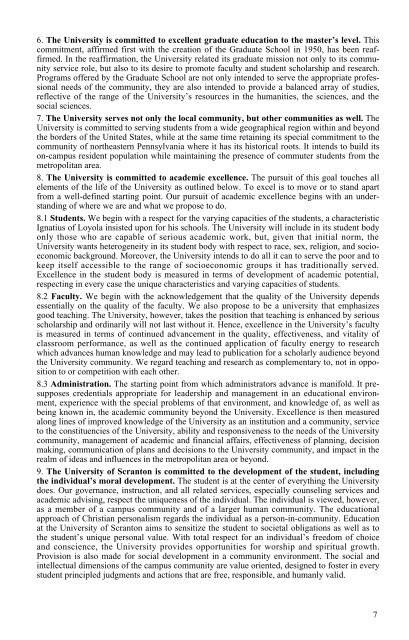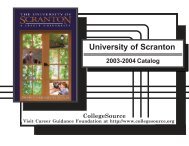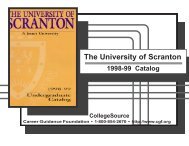Create successful ePaper yourself
Turn your PDF publications into a flip-book with our unique Google optimized e-Paper software.
6. <strong>The</strong> <strong>University</strong> is committed to excellent graduate education to the master’s level. This<br />
commitment, affirmed first with the creation <strong>of</strong> the Graduate School in 1950, has been reaffirmed.<br />
In the reaffirmation, the <strong>University</strong> related its graduate mission not only to its community<br />
service role, but also to its desire to promote faculty and student scholarship and research.<br />
Programs <strong>of</strong>fered by the Graduate School are not only intended to serve the appropriate pr<strong>of</strong>essional<br />
needs <strong>of</strong> the community, they are also intended to provide a balanced array <strong>of</strong> studies,<br />
reflective <strong>of</strong> the range <strong>of</strong> the <strong>University</strong>’s resources in the humanities, the sciences, and the<br />
social sciences.<br />
7. <strong>The</strong> <strong>University</strong> serves not only the local community, but other communities as well. <strong>The</strong><br />
<strong>University</strong> is committed to serving students from a wide geographical region within and beyond<br />
the borders <strong>of</strong> the United States, while at the same time retaining its special commitment to the<br />
community <strong>of</strong> northeastern Pennsylvania where it has its historical roots. It intends to build its<br />
on-campus resident population while maintaining the presence <strong>of</strong> commuter students from the<br />
metropolitan area.<br />
8. <strong>The</strong> <strong>University</strong> is committed to academic excellence. <strong>The</strong> pursuit <strong>of</strong> this goal touches all<br />
elements <strong>of</strong> the life <strong>of</strong> the <strong>University</strong> as outlined below. To excel is to move or to stand apart<br />
from a well-defined starting point. Our pursuit <strong>of</strong> academic excellence begins with an understanding<br />
<strong>of</strong> where we are and what we propose to do.<br />
8.1 Students. We begin with a respect for the varying capacities <strong>of</strong> the students, a characteristic<br />
Ignatius <strong>of</strong> Loyola insisted upon for his schools. <strong>The</strong> <strong>University</strong> will include in its student body<br />
only those who are capable <strong>of</strong> serious academic work, but, given that initial norm, the<br />
<strong>University</strong> wants heterogeneity in its student body with respect to race, sex, religion, and socioeconomic<br />
background. Moreover, the <strong>University</strong> intends to do all it can to serve the poor and to<br />
keep itself accessible to the range <strong>of</strong> socioeconomic groups it has traditionally served.<br />
Excellence in the student body is measured in terms <strong>of</strong> development <strong>of</strong> academic potential,<br />
respecting in every case the unique characteristics and varying capacities <strong>of</strong> students.<br />
8.2 Faculty. We begin with the acknowledgement that the quality <strong>of</strong> the <strong>University</strong> depends<br />
essentially on the quality <strong>of</strong> the faculty. We also propose to be a university that emphasizes<br />
good teaching. <strong>The</strong> <strong>University</strong>, however, takes the position that teaching is enhanced by serious<br />
scholarship and ordinarily will not last without it. Hence, excellence in the <strong>University</strong>’s faculty<br />
is measured in terms <strong>of</strong> continued advancement in the quality, effectiveness, and vitality <strong>of</strong><br />
classroom performance, as well as the continued application <strong>of</strong> faculty energy to research<br />
which advances human knowledge and may lead to publication for a scholarly audience beyond<br />
the <strong>University</strong> community. We regard teaching and research as complementary to, not in opposition<br />
to or competition with each other.<br />
8.3 Administration. <strong>The</strong> starting point from which administrators advance is manifold. It presupposes<br />
credentials appropriate for leadership and management in an educational environment,<br />
experience with the special problems <strong>of</strong> that environment, and knowledge <strong>of</strong>, as well as<br />
being known in, the academic community beyond the <strong>University</strong>. Excellence is then measured<br />
along lines <strong>of</strong> improved knowledge <strong>of</strong> the <strong>University</strong> as an institution and a community, service<br />
to the constituencies <strong>of</strong> the <strong>University</strong>, ability and responsiveness to the needs <strong>of</strong> the <strong>University</strong><br />
community, management <strong>of</strong> academic and financial affairs, effectiveness <strong>of</strong> planning, decision<br />
making, communication <strong>of</strong> plans and decisions to the <strong>University</strong> community, and impact in the<br />
realm <strong>of</strong> ideas and influences in the metropolitan area or beyond.<br />
9. <strong>The</strong> <strong>University</strong> <strong>of</strong> <strong>Scranton</strong> is committed to the development <strong>of</strong> the student, including<br />
the individual’s moral development. <strong>The</strong> student is at the center <strong>of</strong> everything the <strong>University</strong><br />
does. Our governance, instruction, and all related services, especially counseling services and<br />
academic advising, respect the uniqueness <strong>of</strong> the individual. <strong>The</strong> individual is viewed, however,<br />
as a member <strong>of</strong> a campus community and <strong>of</strong> a larger human community. <strong>The</strong> educational<br />
approach <strong>of</strong> Christian personalism regards the individual as a person-in-community. Education<br />
at the <strong>University</strong> <strong>of</strong> <strong>Scranton</strong> aims to sensitize the student to societal obligations as well as to<br />
the student’s unique personal value. With total respect for an individual’s freedom <strong>of</strong> choice<br />
and conscience, the <strong>University</strong> provides opportunities for worship and spiritual growth.<br />
Provision is also made for social development in a community environment. <strong>The</strong> social and<br />
intellectual dimensions <strong>of</strong> the campus community are value oriented, designed to foster in every<br />
student principled judgments and actions that are free, responsible, and humanly valid.<br />
7
















